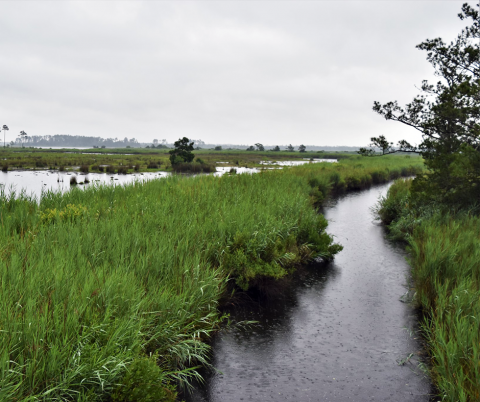Quantifying Wetland Carbon Emissions in the Southeastern United States (2023-2024)
Wetlands are large carbon sinks that play an important role in regulating the global climate. However, climate change will likely compromise the capacity of wetlands to sequester carbon, thereby converting wetlands from important net carbon sinks to net sources of carbon.
This project aimed to 1) identify key climate factors affecting wetland CO2 emissions, and 2) quantify whether, where and when the wetlands will change from carbon sinks to sources due to climate change.
To address these aims, this project team used machine learning models, including random forest (RF), support vector machines, and artificial neural networks, trained with CO2 emission data from AmeriFlux to extrapolate historical wetland CO2 emissions in the Southeast using climate data from NASA.
This study found that incoming shortwave radiation (SW_IN) and the Palmer Drought Severity Index (PDSI) are key predictors of wetland CO2 emissions. The team developed a high-resolution, long-term dataset of wetland CO2 emissions for the Southeastern US (1950-2014), revealing that mid-Atlantic coast and Mississippi Delta wetlands are CO2 sinks, while the Everglades are CO2 sources. This data can inform wetland conservation and future carbon emission studies.
Learn more about this team’s work by reading their team profile.
Timing
Summer 2023 – Spring 2024
Team Outputs
Examining Wetland Carbon Fluxes in the Southeastern U.S. (Team profile; 2024 Fortin Foundation Bass Connections Virtual Showcase)
Sunlight and Flooding/Drought Conditions Dominate Wetland Carbon Fluxes (Poster presented at Fortin Foundation Bass Connections Showcase, April 17, 2024)
See related Climate+ summer project, Quantifying Wetland Carbon Emissions in the Southeastern US (2023).
Image: Goose Creek Game Land Smith Creek boat access, by NC Wetlands, public domain

Team Leaders
- Keqi He, Nicholas School of the Environment–Earth and Climate Sciences–Ph.D. Candidate
- Wenhong Li, Nicholas School of the Environment-Earth and Climate Sciences
/graduate Team Members
-
Qiuying Liao, Master of Environmental Management, Energy and Environment
-
Yan Lu, Master of Egr in Envrnmnt Egr
-
Megan McClaugherty, Master of Environmental Management, Water Resources Management
-
Yan Pan, Earth and Ocean Sciences-PHD
/undergraduate Team Members
-
Matthew Chen
-
Zizhuo Chen
-
Divyansh Jain
-
Aicha Slaitane, DKU Interdisciplinary Studies (BS)
-
Miles Yang, Electrical & Computer Egr(BSE)
-
Sophia Yang
/yfaculty/staff Team Members
-
A. Brad Murray, Nicholas School of the Environment-Earth and Climate Sciences
-
Curtis Richardson, Nicholas School of the Environment-Environmental Sciences and Policy
/zcommunity Team Members
-
Ge Sun, USDA Forest Service – Eastern Forest Environmental Threat Assessment Center
